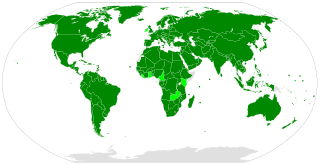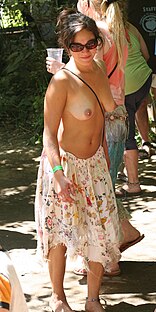 W
WThe Adam Walsh Child Protection and Safety Act is a federal statute that was signed into law by U.S. President George W. Bush on July 27, 2006. The Walsh Act organizes sex offenders into three tiers according to the crime committed, and mandates that Tier 3 offenders update their whereabouts every three months with lifetime registration requirements. Tier 2 offenders must update their whereabouts every six months with 25 years of registration, and Tier 1 offenders must update their whereabouts every year with 15 years of registration. Failure to register and update information is a felony under the law. States are required to publicly disclose information of Tier 2 and Tier 3 offenders, at minimum. It also contains civil commitment provisions for sexually dangerous people.
 W
WThe marriage age in the United States is set by each state and territory, either by statute or the common law applies. An individual can marry in the United States as of right, without parental consent or other authorization, on reaching 18 years of age as that is the age of majority, in all states except in Nebraska, where the general marriage age is 19 as that is the age of majority and Mississippi, where the general marriage age is 21 as that is the age of majority. In Alabama, however, the age of majority is 19, while the general marriage age is 18. When at least one of the marriage partners is under 18–21 years old, the marriage is considered an underage marriage and requires parental consent and/or judicial authorization. Also, minors can marry with "exceptional circumstances”. In many states, an adolescent's marriage automatically emancipates the minor, or increases his or her legal rights beyond allowing the minor to consent to certain medical treatments.
 W
WThe Comstock Laws were a set of federal acts passed by the United States Congress under the Grant administration along with related state laws. The "parent" act was passed on March 3, 1873, as the Act for the "Suppression of Trade in, and Circulation of, Obscene Literature and Articles of Immoral Use". This Act criminalized usage of the U.S. Postal Service to send any of the following items:obscenity contraceptives abortifacients sex toys personal letters with any sexual content or information or any information regarding the above items.
 W
WThe Crime and Disorder Act 1998 (c.37) is an Act of the Parliament of the United Kingdom. The Act was published on 2 December 1997 and received Royal Assent in July 1998. Its key areas were the introduction of Anti-Social Behaviour Orders, Sex Offender Orders, Parenting Orders, granting local authorities more responsibilities with regards to strategies for reducing crime and disorder, and the introduction of law specific to 'racially aggravated' offences. The Act also abolished rebuttable presumption that a child is doli incapax and formally abolished the death penalty for the last offences carrying it, namely treason and piracy.
 W
WFrey v Fedoruk [1950] S.C.R. 517 is a decision by the Supreme Court of Canada on the definition of a breach of the peace and whether being a "peeping tom" is a crime. The Court found that actions do not necessarily breach the peace just because they cause violent reactions. Due to this finding, courts would have less say in determining what is criminal as a breach of the peace, and the Parliament of Canada would have more.
 W
WR v Hess; R v Nguyen, [1990] 2 S.C.R. 906 is a decision of the Supreme Court of Canada where the Court struck down part of the Criminal Code offence of rape as a violation of section 7 of the Canadian Charter of Rights and Freedoms.
 W
WIndecent exposure is a legal expression that describes the deliberate public exposure by a person of a portion of their body in a manner contrary to local standards of appropriate behavior. Laws and social attitudes regarding indecent exposure vary significantly in different countries. It ranges from outright prohibition to prohibition of exposure of certain body parts, such as the genital area, buttocks or breasts.
 W
WJessica's Law is the informal name given to a 2005 Florida law, as well as laws in several other states, designed to protect potential victims and reduce a sexual offender's ability to re-offend. A version of Jessica's Law, known as the Jessica Lunsford Act, was introduced at the federal level in 2005 but was never enacted into law by Congress.
 W
WRights affecting lesbian, gay, bisexual, and transgender (LGBT) people vary greatly by country or jurisdiction – encompassing everything from the legal recognition of same-sex marriage to the death penalty for homosexuality.
 W
WLesbian, gay, bisexual, and transgender (LGBT) rights in Asia are limited in comparison to many other areas of the world. Same-sex sexual activity is outlawed in at least twenty Asian countries. While at least eight countries have enacted protections for LGBT people, only Israel and Taiwan provide a wider range of LGBT rights – including same-sex relationship recognition.
 W
WMegan's Law is the name for a federal law, and informal name for subsequent state laws, in the United States requiring law enforcement authorities to make information available to the public regarding registered sex offenders. Laws were created in response to the murder of Megan Kanka. Federal Megan's Law was enacted as a subsection of the Jacob Wetterling Crimes Against Children and Sexually Violent Offender Registration Act of 1994, which merely required sex offenders to register with local law enforcement. Since only few states required registration prior to Megan's death, the state level legislation to bring states in compliance—with both the registration requirement of Jacob Wetterling Act and community notification required by federal Megan's Law—were crafted simultaneously and are often referred as "Megan's Laws" of individual states. Thus, federal Megan's Law refers to community notification, whereas state level "Megan's Law" may refer to both sex offender registration and community notification.
 W
WThe Optional Protocol on the Sale of Children, Child Prostitution and Child Pornography is a protocol to the Convention on the Rights of the Child and requires parties to prohibit the sale of children, child prostitution and child pornography.
 W
WPasties are patches that cover a person's nipples and areolae, typically affixed with adhesive. Though pasties are commonly associated with strippers, burlesque shows and erotic entertainment, they are also, at times, worn as an undergarment, beachwear, or as a form of protest during women's rights events such as Go Topless Day that may avoid potential prosecution under indecency laws.
 W
WPornography laws by region vary throughout the world. The production and distribution of pornographic films are both activities that are lawful in many, but by no means all, countries so long as the pornography features performers aged above a certain age, usually eighteen years. Further restrictions are often placed on such material.
 W
WThe PROTECT Act of 2003 is a United States law with the stated intent of preventing child abuse as well as investigating and prosecuting violent crimes against children. "PROTECT" is a contrived acronym which stands for "Prosecutorial Remedies and Other Tools to end the Exploitation of Children Today".
 W
WThe Protection of Children Act 1978 is an Act of the Parliament of the United Kingdom that criminalized indecent photographs of children. The Act applies in England and Wales. Similar provision for Scotland is contained in the Civic Government (Scotland) Act 1982 and for Northern Ireland in the Protection of Children Order 1978.
 W
WThe Responsible Parenthood and Reproductive Health Act of 2012, also known as the Reproductive Health Law or RH Law, and officially designated as Republic Act No. 10354, is a law in the Philippines, which guarantees universal access to methods on contraception, fertility control, sexual education, and maternal care.
 W
WSex offender registries in the United States exist at both the federal and state levels. Registries contain information about persons convicted of sexual offenses for law enforcement and public notification purposes. All 50 states and the District of Columbia maintain sex offender registries that are open to the public via websites, although information on some offenders is visible to law enforcement only. Public disclosure of offender information varies between the states depending on offenders designated tier, which may also vary from state to state, or risk assessment result. According to NCMEC, as of 2016 there were 859,500 registered sex offenders in United States.
 W
WThe Sexual Offences Order 2008 provides a new legislative framework for sexual offences in Northern Ireland. The corresponding legislation in England and Wales and in Scotland are the Sexual Offences Act 2003 and the Sexual Offences (Scotland) Act 2009.
 W
WThe Sexual Offences (Scotland) Act 2009 is an Act of the Scottish Parliament. It creates a code of sexual offences that is said to be intended to reform that area of the law. The corresponding legislation in England and Wales is the Sexual Offences Act 2003 and in Northern Ireland the Sexual Offences Order 2008.
 W
WR v Sharpe, 2001 SCC 2 is a constitutional rights decision of the Supreme Court of Canada. The Court balanced the societal interest to regulate child pornography against the right to freedom of expression possessed by the defendants under section 2 of the Canadian Charter of Rights and Freedoms; holding, that while general prohibition of child pornography was constitutional, there were significant limits imposed by the Charter. The decision overturned a ruling by the British Columbia Court of Appeal.
 W
WR v Stevens, [1988] 1 S.C.R. 1153, was a decision of the Supreme Court of Canada rendered on June 30, 1988, concerning the retrospective application of the Canadian Charter of Rights and Freedoms.
 W
WToplessness refers to the state in which a woman's breasts, including her areola and nipples, are exposed, especially in a public place or in a visual medium. The male equivalent is barechestedness, also commonly called shirtlessness.
 W
WThe Town Police Clauses Act 1847 is an Act of the Parliament of the United Kingdom. The statute remains in force and is frequently used by local councils to close roads to allow public events such as processions or street parties to take place. The Act is also used to regulate the local hackney carriage, taxi and private-hire trade in many areas. It deals with a range of street obstructions and nuisances, for example, it makes it illegal to perform certain actions in a public street or other thoroughfare, such as hanging washing, beating carpets, and flying kites. Historically, it was highly significant legislating against indecent exposure, indecent acts, obscene publications, and prostitution.